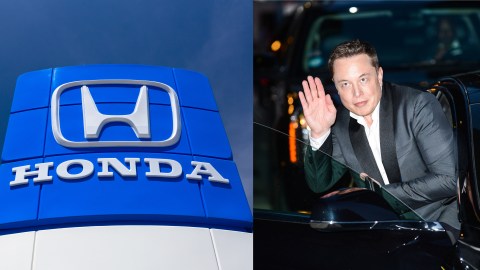Honda Releases Hydrogen-Powered Car, Elon Musk Calls the Technology ‘Bullsh*t’

Transportation accounts for 27 percent of greenhouse gas emissions in the US. The race to a zero-emission economy is upon us, but not everyone is following Tesla’s lead. Honda has improved the hydrogen fuel cell on its latest five-seat sedan, the FCV Clarity. But is it enough to upset Tesla?
Toyota and Hyundai are in the same camp as Honda, betting on hydrogen fuel cells over electric. Elon Musk has been known to call hydrogen fuel cell cars “bullsh*t” and claims their appearance as nothing more than a marketing ploy by car manufacturers. However, he may be a little biased.
So what are hydrogen fuel cells?
They work by converting hydrogen into electricity, which in turn powers the lithium-ion battery pack. Honda’s FCV Clarity can travel up to 434 miles on a single charge, and the only thing that comes out of its tailpipe is water vapor. The FCV Clarity has been priced at 7.66 million yen (around $62,807) and is set to release in Japan in March 2016 with releases in Europe and the United States to follow. However, Musk has already stated that Tesla is soon going to be moving into the third stage of its plan, producing a mass-market car. It’s expected to be priced at $35,000 and roll out before 2020.
The allure of the hydrogen-powered car is apparent. Hydrogen being one of the most common elements on our planet would allow every country to be its own Saudi Arabia. However, hydrogen isn’t often found to exist alone on Earth — it needs to be extracted from other compounds.
Here we come to the primary problem associated with hydrogen fuel cells: How will this hydrogen gas be produced and transported? This one question will dictate how efficient hydrogen fuel cells will be. It can be produced using solar, wind, or biogas, but that doesn’t mean it will be.
It’s the same question Tesla owners have to ask themselves. If the electricity to fuel their Model S is coming from their home, which comes from burning fossil fuels, then calling it a zero-emission vehicle is questionable. Musk himself has pointed this out, which is why he’s also a pusher of solar panels:
Consumers interested in the Honda FCV Clarity shouldn’t just think of the efficiency of the product; they should consider the entire ecosystem that supports it.
***
Natalie has been writing professionally for about 6 years. After graduating from Ithaca College with a degree in Feature Writing, she snagged a job at PCMag.com where she had the opportunity to review all the latest consumer gadgets. Since then she has become a writer for hire, freelancing for various websites. In her spare time, you may find her riding her motorcycle, reading YA novels, hiking, or playing video games. Follow her on Twitter: @nat_schumaker
Photo Credit: YOSHIKAZU TSUNO / Getty Staff





